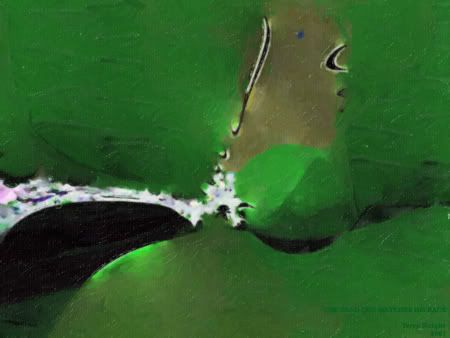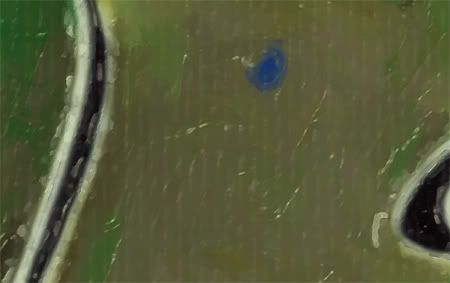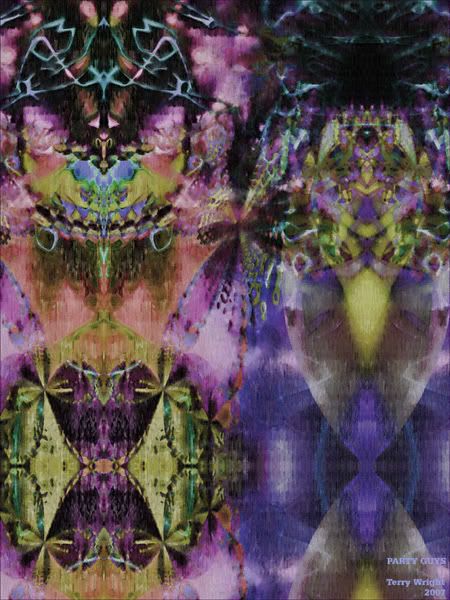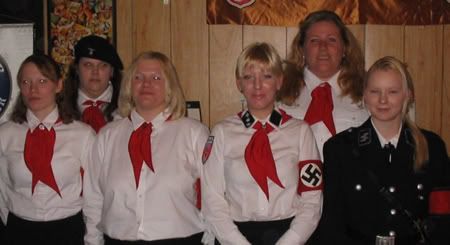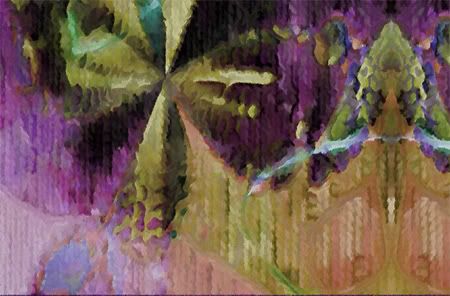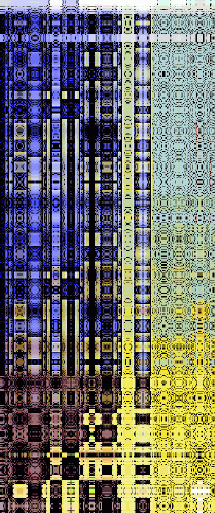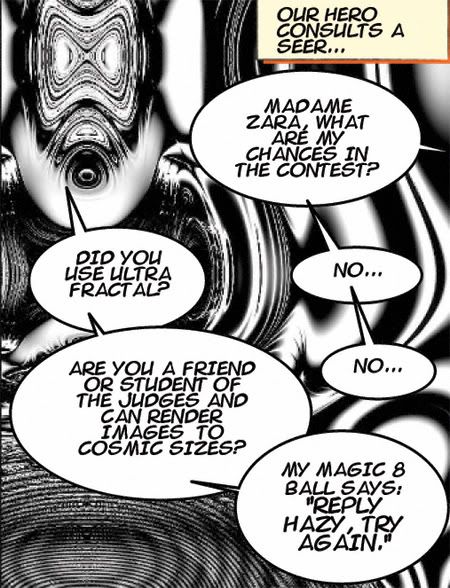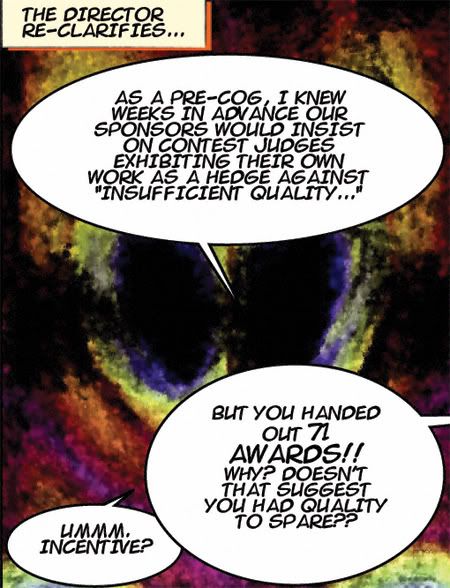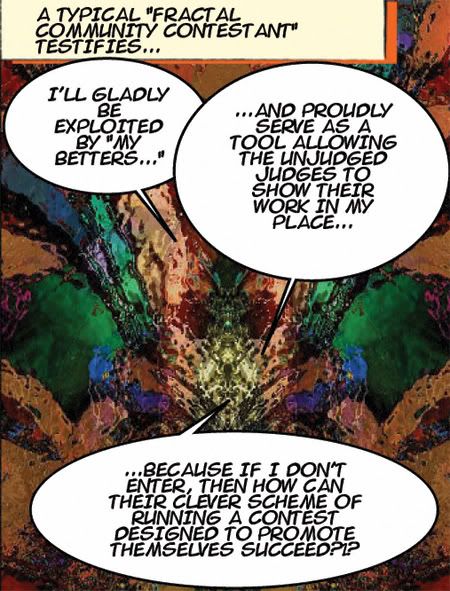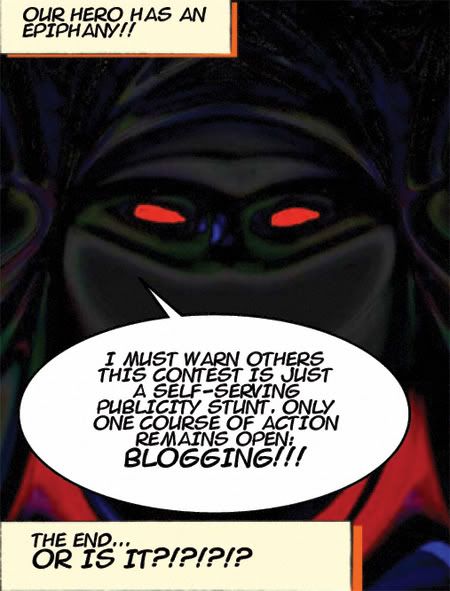As an art lover, one thing I enjoy about the Internet is that I am always only a few mouse clicks away from a
museum.
When Orbit Trap first began, I wrote a post called Morning Walk where I wandered into a few fractal galleries and reflected on what I saw. I'd like to take up that concept again on a semi-regular basis. There is so much good fractal (and fractal-based) art tucked away in the nooks of the Web. It seems to me that one of the obligations of this blog is to dig out fractal gold when one strikes a rich vein.
The advantage of an evening stroll over a morning walk is that hot coffee can be transubstantiated into Jack Daniels. Hopefully, the art we see tonight will burn as it goes all the way down.
No need to call a cab. We're here.
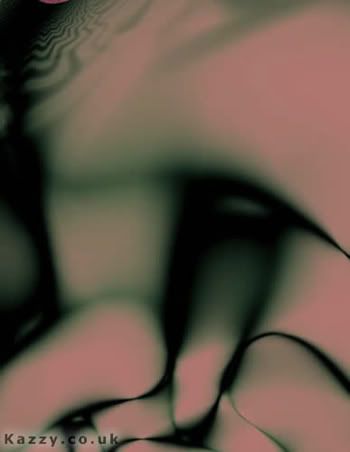
Karen Jones uses minimalistic suggestion to create sumptuous, evocative images. Very few fractal artists can elicit sensuality as well as Jones. Anyone who's worked much with fractals knows that occasionally anatomical surprises sometimes show up unexpectedly. But the result is usually not much more than a giggle. Jones' mines fractals to bring out expressions of sexuality. Her images never result in sniggering. Instead, they are emotionally comforting -- even awe-inspiring.
Jones divides her galleries into thematic blocks. All are worth exploring, but I find some more moving than others -- especially when she walks on grander, more abstract territory. In the "Philosophy" section, for example, the green sweeping arcs of "Sermon" (I'd add links to referenced images, but Jones does not provide such a mechanism) and the fragmentation and use of open space in "Haunting" are both extremely effective. I also like parts of the "Nature" category, especially the stark forms of "Visions of the Moon" -- which reminds me a little of the work of Susan Gardner, another superb fractal minimalist.
But it's in the area of "Sexuality" that Jones excels. Images like "Sleeping Nude" and "Awakenings" are extremely tactile when examining fleshly desires. But there is nothing prurient or salacious about Jones' art. Her ability to capture the tenderness and beauty of sexual activity is a remarkable achievement.
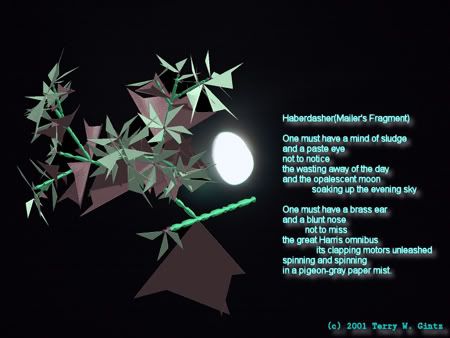
Next stop is Into the Mystic, the sprawling site of programmer/artist/photographer/poet Terry W. Gintz. Gintz might be best known for his considerable talents as a programmer (Fractal Zplot, QuaSZ, Fractal ViZion, Crocus, and many others), but today I'm hanging out in his "Poemscapes Gallery." Having "defaced" (as I was once accused) a few fractals with text myself, I like this media mixing. Gintz has good instincts -- using both photographs and fractals to complement his original poetry. The balance works well to create a synergy where neither the image nor the text subsumes but rather brings about a harmonious balance. Moreover, especially compared to some other fractalists who dabble in verse, Gintz is an excellent poet in his own right. His writings are always integrated seamlessly and thematically to his images. Nature (and its ongoing, encroaching loss) is one common theme -- but Gintz also shares a deep affinity with the Beats -- especially in how poets like Corso would blend elevated language with more common vernacular. "Rush Hour (Zero Emissions)" serves as a prime example of this tendency:
This seething beneath the surface
this impatience for action,
a matchbook of dreams
a flood of farthlings.
No use shooting for grouse
when the roasting pan eludes us.
Watch the fender, buddy!
The metaphors of fire, hunting, and flocking all combine to suggest the restless turbulence about to explode in a rush hour road rage. Other favorites of mine include the heavily post-processing and lush language of "Specialty of the House" (and a poem as sensual as Jones' work) and an upset-the-9/11-oxcart piece called "Postscript to Atta's Sunset Diary" with an ending sure to puzzle the irony-deprived. I hear that Gintz has wandered into areas other than programming and fractal art lately -- and with his prodigious talents I guess that's no surprise. But I always find new surprises in the recessed longitudes and latitudes of his "poemscapes."
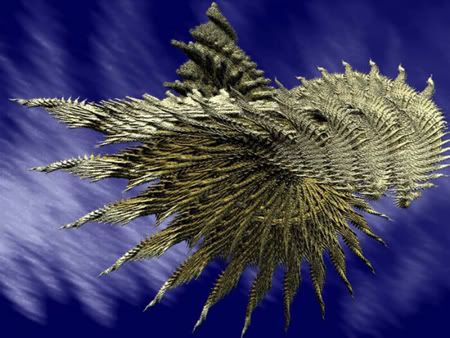
We've been plenty critical here at OT of this year's Benoit Mandelbrot Fractal Art Contest's judges over the last few months. However, one thing they sometimes got right was the competition's winning and alternate selections. I especially liked Susan Chambless' luminescent "Shuttered Windows", Liz Nixon's radiant "Brushfire" (is it a heavily processed Apo image?), and Vivian Woods' complex, dynamic "Merlin's Quest." It was also nice to find a few XenoDream images in the winner's circle, including "Sunset Mood" -- a striking piece from Stefan Vitanov. A quick surf over to his galleries is well worth your time.
There's so much to see, it's hard to know where to start. I wandered first into Vitanov's "Ruins" room -- where one finds a stunning assortment of Fractint works crumbling away like Roman antiquities. I dug the precision of "Architectural Study" and "Golden Temple" -- quite a contrast to the chaotic, colorful collisions in his "Abstract" gallery like "Short Before Sunrise 3."
But it's the 3D art from XenoDream that really dazzles -- like the image above from the "Shells" gallery or much of the art from "Dreamscapes." Ornate cityscapes, like "Downtown (Part 2)" -- this one complete with a fractal sky -- rise up to tower in elaborate, telescopic detail. One of my favorites, and certainly among the most rarefied, is "House of Despair" -- a monolith that reminded me (with a shudder) of the blown-away facade of the Alfred P. Murrah Federal Building after the Oklahoma City bombing. Tolkien fans will have fun scrutinizing "Near the Mordor's Gate." Is that the Eye of Sauron I spy at the apex of the tallest pyramid? And I've only scratched the surface of Vitanov's expansive site.
Well, it looks like the blog's about to close for the night. I hope you enjoyed taking a jaunt with me. I plan to take more walks and strolls in the future. After all, there's no shortage of inventive fractal artists in cyberspace.
~/~
BMFAC UPDATE--
And speaking of the contest-under-a-microscope, the discussion of the propriety of the 2007 Benoit Mandelbrot Fractal Art Contest spilled over into the Xenodreamers YahooGroup last week (you'll need to become a member in order to read postings). The contest director and I had a few short exchanges. The most interesting moment was when I asked:
Now that you and the panel members passed out a whopping 71 awards honoring quality this year, doesn't that mean you can comfortably scrap including the judges' work (40% of the exhibition, by the way) next year and keep the contest strictly for the contestants?
To which contest director, Damien M. Jones, said:
Actually, yes.
It will be interesting to see if he actually keeps his word. Or will, once more, the contest scapegoats sponsors again "insist" (weeks before being named and via telepathy) that the previous model of hanging (on the wall) judges be kept intact? Time will tell.
Of course, our critiques here at OT had absolutely nothing to do with this sudden, surprising reversal. Jones said the whole issue was "dead," and I noted that our OT Inbox suggests the contest controversy is far from deceased. Jones retorted that the email he's received notes Tim and I are "being ridiculous," and I observed in turn that
It's possible my circle of correspondence is not quite as closed as yours.
Jones, echoing the tired "sour grapes" refrain of other OT commenters, questioned my motivations by observing:
We made it much clearer right from the start that panel members' artwork would also be included. Apparently you didn't find the terms too objectionable, since you entered the contest yourself. Aren't you just complaining because your work wasn't selected?
I responded by saying:
I've never denied that you did not make your terms public. But open disclosure does not mean your guidelines are inherently ethical or fair. The question is really one of propriety.
You've accused me of "sour grapes" several times now. The fact that I entered the contest actually shows just the opposite.
I like to enter contests -- at least once. You learn a lot about a contest by participating in it. You come to see how things are run and how you are treated as a contestant. In many writing contests, you cannot see or read the winning work unless you do enter. Once you've "experienced" a contest, then you're better able to decide if further participation is in your best interest.
I've been writing for 32 years and making art for 11 years. I bet I've entered probably 200+ contests. I did not win or place in most of the competitions I entered. Yet, in all that time, I have only questioned the operation of two contests: yours and the Fractal Universe calendar. There's a reason. You both have something in common -- you mix the work of judges/editors with those they have judged/edited. Such a practice is widely regarded as an unprofessional conflict of interest.
If I was all eaten up with the bitterness of not being selected, wouldn't I be firing off vinegary missives each time I lost? Yet, I've only raised questions about two contests in over thirty years.
It's a matter of principle, Damien.
Stay tuned. As Yogi Berra liked to say: It ain't over till it's over.
~/~
Technorati Tags: fractal, fractal art, fractal contest, digital art, Benoit Mandelbrot Fractal Art Contest, orbit trap, gallery stroll, stefan vitanov, terry w gintz, karen jones








